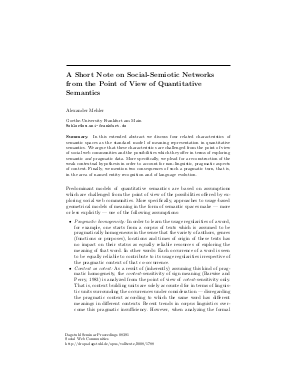A Short Note on Social-Semiotic Networks from the Point of View of Quantitative Semantics
Author Alexander Mehler
-
Part of:
Volume:
Dagstuhl Seminar Proceedings, Volume 8391
Part of: Series: Dagstuhl Seminar Proceedings (DagSemProc) - License:
 Creative Commons Attribution 4.0 International license
Creative Commons Attribution 4.0 International license
- Publication Date: 2008-12-22
File

PDF
DagSemProc.08391.7.pdf
- Filesize: 128 kB
- 5 pages
Document Identifiers
Subject Classification
Keywords
- Semantic space
- social web community
- quantitative semantic weak contextual hypothesis
Metrics
- Access Statistics
-
Total Accesses (updated on a weekly basis)
0PDF Downloads0Metadata Views
Abstract
In this extended abstract we discuss four related characteristics of semantic spaces as the standard model of meaning representation in quantitative semantics. We argue that these characteristics are challenged from the point of view of social web communities and the possibilities which they offer in terms of exploring semantic emph{and} pragmatic data. More specifically, we plead for a reconstruction of the weak contextual hypothesis in order to account for non-linguistic, pragmatic aspects of context. Finally, we mention two consequences of such a pragmatic turn, that is, in the area of named entity recognition and of language evolution.
Cite As Get BibTex
Alexander Mehler. A Short Note on Social-Semiotic Networks from the Point of View of Quantitative Semantics. In Social Web Communities. Dagstuhl Seminar Proceedings, Volume 8391, pp. 1-5, Schloss Dagstuhl – Leibniz-Zentrum für Informatik (2008)
https://doi.org/10.4230/DagSemProc.08391.7
BibTex
@InProceedings{mehler:DagSemProc.08391.7,
author = {Mehler, Alexander},
title = {{A Short Note on Social-Semiotic Networks from the Point of View of Quantitative Semantics}},
booktitle = {Social Web Communities},
pages = {1--5},
series = {Dagstuhl Seminar Proceedings (DagSemProc)},
ISSN = {1862-4405},
year = {2008},
volume = {8391},
editor = {Harith Alani and Steffen Staab and Gerd Stumme},
publisher = {Schloss Dagstuhl -- Leibniz-Zentrum f{\"u}r Informatik},
address = {Dagstuhl, Germany},
URL = {https://drops.dagstuhl.de/entities/document/10.4230/DagSemProc.08391.7},
URN = {urn:nbn:de:0030-drops-17884},
doi = {10.4230/DagSemProc.08391.7},
annote = {Keywords: Semantic space, social web community, quantitative semantic weak contextual hypothesis}
}
